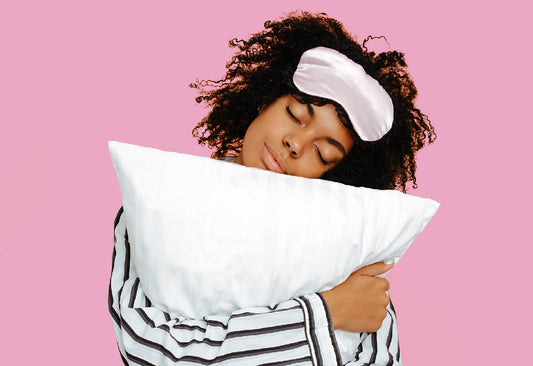Sleep is one of the 3 pillars of optimal well-being in humans, alongside physical activity and a healthy diet.
Shockingly, 1 in 3 of us suffer from poor sleep.1
We’ve all been there after an awful night’s sleep - dragging ourselves out of bed in the morning feeling groggy, drained, and lacking focus before the days even started!
However, consistently poor sleep can have a much greater cost on our health such as:
- Increasing our risk of obesity, heart disease, and diabetes.
- Shortening our life expectancy.2
In these modern times, digital screens, stress, caffeine consumption, among many other influences, are often to blame for poor sleep due to causing disruptions with our circadian rhythm (more on this below).
These influences are difficult to avoid, and it’s the primary cause of common sleep disorders such as insomnia.
As it can often be difficult to achieve natural, good quality sleep, we may need a little help with re-adjusting our body clock and regulating our sleeping patterns.
In this article, we’ll cover the benefits of melatonin and how long it takes to kick in to help you get your sleep schedule back on track!
But before we delve into the details, let’s go over a quick 101 on melatonin:
Melatonin 101
Melatonin is a natural hormone made by your body’s pineal gland; a small pea-shaped gland found in your brain. Melatonin is best known for regulating your bodies circadian rhythm, which is our 24-hour internal clock i.e., our sleep-wake cycle.
It’s secreted from this gland in response to the absence of light in the night-time, giving our bodies the signal that it’s sleep time. Then, during the daylight hours, our melatonin production is suppressed, signalling us to wake up for the day!
Low melatonin production can have adverse effects on our sleep quality3. Night shift workers, those with sleep disorders and frequent travellers are often the types of people who experience these sleep disruptions caused by low melatonin production.
While our body naturally produces melatonin, there are supplements available that can help us normalise any abnormal sleeping patterns. Our top pick would of course be Performance Lab Sleep.
Other Benefits Of Melatonin
It’s widely known that melatonin can aid sleep, and better sleep will improve many health markers.
Improved mood, stronger immunity, reduced stress levels, and improved attention and concentration are among many benefits of consistent good quality sleep4.
But are there any other benefits to melatonin?
It appears so! Melatonin is a powerful antioxidant and has several anti-cancer properties. Some research also suggests melatonin supplementation may benefit eye health and potentially reduce symptoms associated with tinnitus.5
As a result of these additional benefits, melatonin would really compliment an athlete’s performance and recovery due to the ability to aid sleep and reap the antioxidant benefits!
Where Can We Find Melatonin?
Not only is melatonin produced naturally in our body, but it’s also found in some foods.
The best natural source of melatonin:
- Montmorency Tart Cherry
Montmorency Tart Cherry is well-researched, particularly among athletic populations, due to the antioxidant benefits and the notable improvements in sleep quality and quantity6.
Other melatonin-rich foods include:
- Grapes
- Fish
- Eggs
- Mixed nuts, seeds & legumes
- Pigmented rice
- Cereals
You can naturally boost your melatonin levels through regularly consuming these foods, as well as boosting your intake of other vitamins and minerals essential for good health.
Supplementing With Melatonin
When To Take
Combined with a consistent bedtime routine, taking melatonin 30-minutes prior to your intended sleep time is thought to be most effective in aiding the time it takes for you to fall sleep. As melatonin is the sleep hormone, or also known as the “hormone of darkness”, I wouldn’t be tempted to take it during the daytime in the hopes it’ll help you nap, as this could further hinder your natural sleep cycle!
Dosage
The optimal dosage of melatonin is 0.5mg to begin with to determine your personal tolerance, and if that has no effect, 3-5mg is thought to be an effective dose in helping you regulate your sleep cycle. Taking more will not necessarily result in you falling asleep faster, or having a better night’s sleep, so stick to the recommended dose for optimal results!
Side Effects
There are few notable side effects of melatonin supplementation in adults, though it’s always best to consult a doctor before taking any supplements!
Take-Home Message
We currently live in a stressful, artificially lit world where it’s often hard to achieve a naturally good quality sleep.
Our environment and screen exposure doesn’t cater well for the production of melatonin, and while we can improve our natural production by reducing screen time and dimming our lights come the evening, it’s not always a feasible approach nowadays.
Who doesn’t want to wind down in the evenings binging the latest series on Netflix or scrolling through TikTok?!
This is why a melatonin supplement should be considered if you want to really dial in a consistent sleep schedule and achieve optimal sleep quality as a result!
References
- https://www.nhs.uk/live-well/sleep-and-tiredness/why-lack-of-sleep-is-bad-for-your-health/
- https://www.nhs.uk/live-well/sleep-and-tiredness/why-lack-of-sleep-is-bad-for-your-health/
- https://www.sleepfoundation.org/melatonin
- https://www.bupa.co.uk/newsroom/ourviews/nine-benefits-good-night-sleep
- https://examine.com/supplements/melatonin/
- https://pubmed.ncbi.nlm.nih.gov/20438325/















